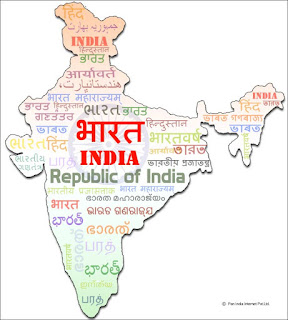The name India is derived from Indus, which originates from the Old Persian word Hinduš. The latter term stems from the Sanskrit word Sindhu, which was the historical local appellation for the Indus River.
It is very important to know that The Republic of India has two principal short names in both official and popular English usage, each of which is historically significant, India and Bharat. The first article of the Constitution of India states that "India, that is Bharat, shall be a union of states," implicitly codifying India and Bharat as equally official short names for the Republic of India.
It is very important to know that The Republic of India has two principal short names in both official and popular English usage, each of which is historically significant, India and Bharat. The first article of the Constitution of India states that "India, that is Bharat, shall be a union of states," implicitly codifying India and Bharat as equally official short names for the Republic of India.
The name Bhārata (भारत) came from emperor Bharata and it has been used as a self-ascribed name by people of the Indian subcontinent and the Republic of India. The designation Bhārata appears in the official Sanskrit name of the country, Bhārata Gaṇarājya. The name is derived from the ancient Hindu Puranas, which refer to the land that comprises India as Bhāratavarṣa (Sanskrit: भारतवर्ष, lit. country of Bharata) and uses this term to distinguish it from other varṣas or continents. For example, the Vayu Puranas say "he who conquers the whole of Bhāratavarṣa is celebrated as a samrāt (Vayu Purana 45, 86)."
According to the most popular theory, the name Bhārata is the vrddhi of Bharata, a king mentioned in Rigveda.[citation needed]
The Sanskrit word bhārata is a vṛddhi derivation of Bharata, which was originally an epithet of Agni. The term is a verbal noun of the Sanskrit root bhr-, "to bear / to carry", with a literal meaning of "to be maintained" (of fire). The root bhr is cognate with the English verb to bear and Latin ferō.
This term also means "one who is engaged in search for knowledge".
According to the Puranas, this country is known as Bharatavarsha after the King Bharata. This has been mentioned in Vishnu Purana (2,1,31), Vayu Purana,(33,52), Linga Purana(1,47,23), Brahmanda Purana (14,5,62), Agni Purana ( 107,11–12), Skanda Purana, Khanda (37,57) and Markandaya Purana (50,41), all using the designation Bharata Varsha.
Vishnu Purāna mentions:
ऋषभो मरुदेव्याश्च ऋषभात भरतो भवेत्
भरताद भारतं वर्षं, भरतात सुमतिस्त्वभूत्
Rishabha was born to Marudevi, Bharata was born to Rishabha,
Bharatavarsha (India) arose from Bharata, and Sumati arose from Bharata.
—Vishnu Purana (2,1,31)
ततश्च भारतं वर्षमेतल्लोकेषुगीयते
भरताय यत: पित्रा दत्तं प्रतिष्ठिता वनम (विष्णु पुराण, २,१,३२)
This country is known as Bharatavarsha since the times the father entrusted the kingdom to the son Bharata and he himself went to the forest for ascetic practices
—Vishnu Purana (2,1,32)
The Bhāratas were an vedic tribe mentioned in the Rigveda, notably participating in the Battle of the Ten Kings.
The realm of Bharata is known as Bharātavarṣa in the Mahabhārata (the core portion of which is itself known as Bhārata) and later texts. The term varsa means a division of the earth, or a continent.
A version of the Bhagavata Purana attests that the name Bharata is after Jata Bharata who appears in the fifth canto of the Bhagavata.
- Vishnu Purana (2.3.1)
uttaraṃ yatsamudrasya himādreścaiva dakṣiṇam
varṣaṃ tadbhārataṃ nāma bhāratī yatra santatiḥ
उत्तरं यत्समुद्रस्य हिमाद्रेश्चैव दक्षिणम् ।
वर्षं तद् भारतं नाम भारती यत्र संततिः ।।
"The country (varṣam) that lies north of the ocean and south of the snowy mountains is called Bhāratam; there dwell the descendants of Bharata."
The term in Classical Sanskrit literature is taken to comprise the present day territories of Indian subcontinent. This corresponds to the approximate extent of the historical Mauryan Empire under Emperors Chandragupta Maurya and Emperor Ashoka (4th to 3rd centuries BC). Later, political entities unifying approximately the same region are the Mughal Empire (17th century), the Maratha Empire (18th century) and the British Raj (19th to 20th centuries).










0 comments:
Post a Comment